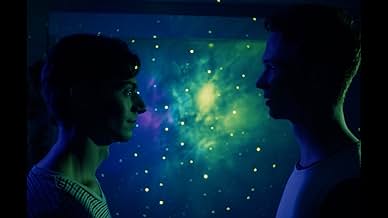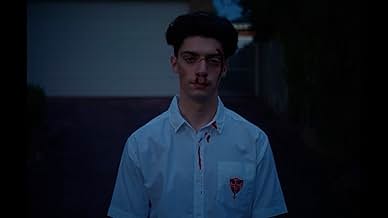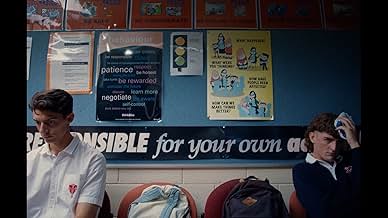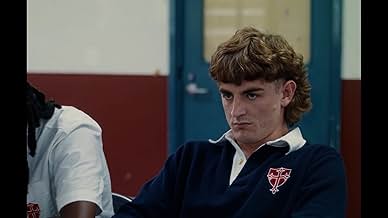Ajouter une intrigue dans votre langueA seventeen-year-old boy struggles to understand and embrace his sexuality as he comes of age in the working class suburbs on Melbourne's edge.A seventeen-year-old boy struggles to understand and embrace his sexuality as he comes of age in the working class suburbs on Melbourne's edge.A seventeen-year-old boy struggles to understand and embrace his sexuality as he comes of age in the working class suburbs on Melbourne's edge.
- Prix
- 2 victoires et 4 nominations au total
Avis en vedette
I watched this thinking - this must be a retro film that takes place in the 1980's, but then they are texting each other - so that can't be. Can Australia filmmakers really think this is how it is in the 21st Century.
The first thing that struck me was the idiotic writing given to the family. The dinner table discussions, the way they treat their son when he comes home from an all nighter - no family speaks or acts like this in the 2020's. They were so over the top that it became ludicrous.
If this had been labelled a period piece, I might have understood all the homophobia, guilt, and angst - but it is not presented that way.
And I have to agree with another reviewer - where are all the responsible adults in this movie. No teachers, no counselors, no security or would they have gotten in the way of the ridiculous plot?
And sorry, all of you that are praising this film, obviously haven't seen a good coming out movie. Let me assure you, this isn't one of them.
The first thing that struck me was the idiotic writing given to the family. The dinner table discussions, the way they treat their son when he comes home from an all nighter - no family speaks or acts like this in the 2020's. They were so over the top that it became ludicrous.
If this had been labelled a period piece, I might have understood all the homophobia, guilt, and angst - but it is not presented that way.
And I have to agree with another reviewer - where are all the responsible adults in this movie. No teachers, no counselors, no security or would they have gotten in the way of the ridiculous plot?
And sorry, all of you that are praising this film, obviously haven't seen a good coming out movie. Let me assure you, this isn't one of them.
In his feature debut, writer-director Gabriel Carrubba delivers an extraordinary cinematic portrait with Sunflower, a raw, poignant, and deeply personal exploration of adolescent sexuality, identity, and resilience in the unyielding suburbs of Melbourne. Rarely does a film balance such unflinching authenticity with tender optimism, and Sunflower is nothing short of revelatory-a shining addition to the canon of LGBTQIA+ coming-of-age dramas.
At its core, Sunflower centers on Leo (Liam Mollica), a 17-year-old grappling with the complexities of self-discovery in a world bound by the suffocating codes of toxic masculinity. Mollica, in a career-defining performance, embodies Leo's vulnerability and confusion with an emotional precision that grips you from the opening scene-a startling juxtaposition of Leo standing amid golden sunflowers and the brutal violence of a gay bashing in a concrete schoolyard. This stark visual metaphor sets the stage for the dualities of Leo's journey: longing and fear, connection and isolation, love and rejection.
Leo's relationship with his best friend, the rough-edged and aptly named Boof (Luke J. Morgan), anchors the film's exploration of adolescent masculinity. Their interactions-laden with homoerotic undertones and veiled desires-are achingly real. Wrestling matches and shared moments of intimacy simmer with unspoken tension, only to erupt in a kiss that changes everything. Boof's betrayal, fueled by his own insecurities, unleashes a torrent of homophobia that engulfs Leo's world, yet Carrubba never allows the narrative to descend into despair without hope.
The triumph of Sunflower lies in its layered storytelling and deft character work. Carrubba avoids caricatures, granting even the most antagonistic characters depth and humanity. Boof's bravado masks his own fears; Leo's parents (Diana Ferreira and Sal Galofaro) vacillate between love and the constraints of their working-class values; and Leo's younger brother's best friend, Cam (Jacob Pontil-Scala), provides a glimmer of possibility. The film also introduces Tom (Daniel Halmarick), a quiet, empathetic schoolmate whose budding friendship with Leo feels like the emotional lifeline every queer teenager deserves.
Carrubba's direction is unflinching yet tender, weaving moments of devastating isolation with bursts of euphoric liberation. The cinematography by Martine Wolff is a standout, capturing the gritty authenticity of Melbourne's suburbs while infusing scenes with a dreamlike lyricism. The titular sunflower becomes a recurring motif-a potent metaphor for Leo's blossoming self-acceptance. Whether bathed in the harsh fluorescent lights of a school locker room or the golden glow of a sun-drenched field, Wolff's visuals ground the film's emotional peaks and valleys in a visceral reality.
What elevates Sunflower above its genre contemporaries is its emotional resonance and universality. While it draws comparisons to films like Giant Little Ones and Close, Sunflower carves its own path with an honesty that feels uniquely Australian. The dialogue, while understated, captures the halting speech of teenagers navigating uncharted emotional waters. Carrubba's script, informed by his own experiences growing up in Melbourne's suburbs, pulses with authenticity. The film doesn't shy away from the brutality of homophobia, but it also celebrates the resilience of queer youth and the beauty of finding your tribe, even in the darkest moments.
Mollica's performance as Leo is magnetic. He conveys a world of emotion with a glance, his expressive eyes capturing the quiet devastation of rejection and the tentative joy of self-discovery. Morgan's Boof is both menacing and tragic, embodying the toxic masculinity that suffocates so many young men. Halmarick, in his film debut, brings a quiet strength to Tom, whose compassion becomes a beacon for Leo's journey. Together, this young cast breathes life into a narrative that feels deeply lived-in and profoundly moving.
The film's closing moments are a masterstroke of catharsis, juxtaposing the bitter sting of betrayal with the luminous promise of acceptance. As Leo stands in a field of sunflowers, his journey from self-loathing to self-love reaches a crescendo that leaves the audience breathless. It's a testament to Carrubba's vision that this moment feels neither saccharine nor contrived but wholly earned-a radiant declaration of queer joy in a world that too often seeks to dim it.
Sunflower is more than a film; it's a lifeline for those navigating the rocky terrain of self-acceptance. In a time when LGBTQIA+ stories are more essential than ever, Carrubba's debut reminds us of the transformative power of cinema to heal, inspire, and connect. Like its titular flower, Sunflower turns its face toward the light, offering hope and affirmation to anyone who has ever felt alone in their identity. It is, without question, one of the most important and beautiful films of the year-a radiant masterpiece that deserves to be celebrated for generations to come.
Amazing work to the cast & crew.
Bravo!
At its core, Sunflower centers on Leo (Liam Mollica), a 17-year-old grappling with the complexities of self-discovery in a world bound by the suffocating codes of toxic masculinity. Mollica, in a career-defining performance, embodies Leo's vulnerability and confusion with an emotional precision that grips you from the opening scene-a startling juxtaposition of Leo standing amid golden sunflowers and the brutal violence of a gay bashing in a concrete schoolyard. This stark visual metaphor sets the stage for the dualities of Leo's journey: longing and fear, connection and isolation, love and rejection.
Leo's relationship with his best friend, the rough-edged and aptly named Boof (Luke J. Morgan), anchors the film's exploration of adolescent masculinity. Their interactions-laden with homoerotic undertones and veiled desires-are achingly real. Wrestling matches and shared moments of intimacy simmer with unspoken tension, only to erupt in a kiss that changes everything. Boof's betrayal, fueled by his own insecurities, unleashes a torrent of homophobia that engulfs Leo's world, yet Carrubba never allows the narrative to descend into despair without hope.
The triumph of Sunflower lies in its layered storytelling and deft character work. Carrubba avoids caricatures, granting even the most antagonistic characters depth and humanity. Boof's bravado masks his own fears; Leo's parents (Diana Ferreira and Sal Galofaro) vacillate between love and the constraints of their working-class values; and Leo's younger brother's best friend, Cam (Jacob Pontil-Scala), provides a glimmer of possibility. The film also introduces Tom (Daniel Halmarick), a quiet, empathetic schoolmate whose budding friendship with Leo feels like the emotional lifeline every queer teenager deserves.
Carrubba's direction is unflinching yet tender, weaving moments of devastating isolation with bursts of euphoric liberation. The cinematography by Martine Wolff is a standout, capturing the gritty authenticity of Melbourne's suburbs while infusing scenes with a dreamlike lyricism. The titular sunflower becomes a recurring motif-a potent metaphor for Leo's blossoming self-acceptance. Whether bathed in the harsh fluorescent lights of a school locker room or the golden glow of a sun-drenched field, Wolff's visuals ground the film's emotional peaks and valleys in a visceral reality.
What elevates Sunflower above its genre contemporaries is its emotional resonance and universality. While it draws comparisons to films like Giant Little Ones and Close, Sunflower carves its own path with an honesty that feels uniquely Australian. The dialogue, while understated, captures the halting speech of teenagers navigating uncharted emotional waters. Carrubba's script, informed by his own experiences growing up in Melbourne's suburbs, pulses with authenticity. The film doesn't shy away from the brutality of homophobia, but it also celebrates the resilience of queer youth and the beauty of finding your tribe, even in the darkest moments.
Mollica's performance as Leo is magnetic. He conveys a world of emotion with a glance, his expressive eyes capturing the quiet devastation of rejection and the tentative joy of self-discovery. Morgan's Boof is both menacing and tragic, embodying the toxic masculinity that suffocates so many young men. Halmarick, in his film debut, brings a quiet strength to Tom, whose compassion becomes a beacon for Leo's journey. Together, this young cast breathes life into a narrative that feels deeply lived-in and profoundly moving.
The film's closing moments are a masterstroke of catharsis, juxtaposing the bitter sting of betrayal with the luminous promise of acceptance. As Leo stands in a field of sunflowers, his journey from self-loathing to self-love reaches a crescendo that leaves the audience breathless. It's a testament to Carrubba's vision that this moment feels neither saccharine nor contrived but wholly earned-a radiant declaration of queer joy in a world that too often seeks to dim it.
Sunflower is more than a film; it's a lifeline for those navigating the rocky terrain of self-acceptance. In a time when LGBTQIA+ stories are more essential than ever, Carrubba's debut reminds us of the transformative power of cinema to heal, inspire, and connect. Like its titular flower, Sunflower turns its face toward the light, offering hope and affirmation to anyone who has ever felt alone in their identity. It is, without question, one of the most important and beautiful films of the year-a radiant masterpiece that deserves to be celebrated for generations to come.
Amazing work to the cast & crew.
Bravo!
From my perspective, this film addresses the trauma any LGBTQ+ person could likely face when they are not ready to come out on their own accord.
When betrayal, ridicule and isolation become a central feature in a young persons life, even family members react when the fear of rejection overwhelms our lead and he recoils into self depression and reflection.
Terrified of being ostracized by his own family.
Something many LGBTQ+ youth face daily.
The story pits homophobia, intolerance, hatred, betrayal, social norms and bullying against family, friends, love and acceptance.... In a manner that is easily digested...even for a younger LGBTQ+ audience...which I assume is the target audience.
The acting is believable, forthright and caring for the storyline portrayed.
The script, although requires a level of self determination to piece together the different scenes, does so in a easily to follow manner that most will understand how each scene needs to be determined.
Overall, I believe many young LGBTQ+ youth will find solace in the film, to understand the pitfalls concerns and outright dangers coming out, or being outed could be faced, even in 2024. While understanding there are still negative issues that need to be addressed, this film also addresses the understanding there are benefits such as love, acceptance and self fulfilment.....on the other side.
In conclusion, I find this film to evoke a sense of survival, fear, panic, anger, as well as strength, power, honour, serenity and love.... This is a roller coaster ride through emotions...and it is one exciting ride.....
When betrayal, ridicule and isolation become a central feature in a young persons life, even family members react when the fear of rejection overwhelms our lead and he recoils into self depression and reflection.
Terrified of being ostracized by his own family.
Something many LGBTQ+ youth face daily.
The story pits homophobia, intolerance, hatred, betrayal, social norms and bullying against family, friends, love and acceptance.... In a manner that is easily digested...even for a younger LGBTQ+ audience...which I assume is the target audience.
The acting is believable, forthright and caring for the storyline portrayed.
The script, although requires a level of self determination to piece together the different scenes, does so in a easily to follow manner that most will understand how each scene needs to be determined.
Overall, I believe many young LGBTQ+ youth will find solace in the film, to understand the pitfalls concerns and outright dangers coming out, or being outed could be faced, even in 2024. While understanding there are still negative issues that need to be addressed, this film also addresses the understanding there are benefits such as love, acceptance and self fulfilment.....on the other side.
In conclusion, I find this film to evoke a sense of survival, fear, panic, anger, as well as strength, power, honour, serenity and love.... This is a roller coaster ride through emotions...and it is one exciting ride.....
This movie really hit home with me. Reminded me alot of what I went through growing up, except I didn't come out until after high school. When you are young and gay you feel like you are the only one in the world going through it. You feel like no one else understands it. You feel like you are different than every other person at your school. But then you find out, you are not alone. There are other people like you.
So, for those of you who are going through growing up and being gay, know that it gets better. I know it can be very lonely and depressing going through it alone, but there are many many others going through the same thing. You will find yourself. Give it time. Far too many young gay people have been lost thinking they cannot handle things. Stay strong, it WILL get better!
9/10.
So, for those of you who are going through growing up and being gay, know that it gets better. I know it can be very lonely and depressing going through it alone, but there are many many others going through the same thing. You will find yourself. Give it time. Far too many young gay people have been lost thinking they cannot handle things. Stay strong, it WILL get better!
9/10.
This is a classic coming of age movie about a gay teenage boy. It has all of the elements of a gay teenager's real life experiences. Rocky relationship with parents, crappy homophobic friends, girl crushing on closet case, denial phase, gay bashing, coming out to parents, and first true love. It was acted out decently and delivered sensitively. There's no unnecessary long scenes, every minute was essential to the plot. It also teaches us a lot of moral lesson on how to be a decent human being (just do the exact opposite of everything that crappy friend of Leo's did). It also teaches parents on how to accept reality, no matter how harsh it felt. Too bad, it didn't teach us about the consequences of doing gay bashing. Otherwise it would've been an even better movie. But to summarize, this is a decent drama to watch.
Le saviez-vous
- ConnexionsReferences E.T. l'extraterrestre (1982)
Meilleurs choix
Connectez-vous pour évaluer et surveiller les recommandations personnalisées
- How long is Sunflower?Propulsé par Alexa
Détails
Box-office
- Brut – à l'échelle mondiale
- 23 531 $ US
- Durée1 heure 24 minutes
- Couleur
- Rapport de forme
- 1.85 : 1
Contribuer à cette page
Suggérer une modification ou ajouter du contenu manquant

























